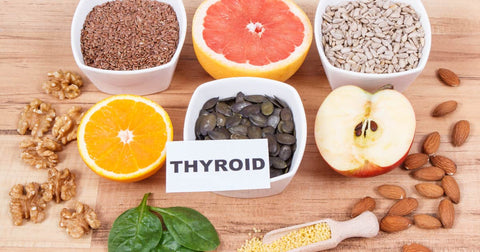The thyroid gland, a small butterfly-shaped organ nestled at the base of your neck, plays a crucial role in your body's metabolic processes. It produces hormones that regulate your metabolism, energy levels, and overall bodily functions. However, the delicate balance of thyroid function can be disrupted by various factors, including diet and food intolerances. While the connection between diet and thyroid health has been recognized, the specific impact of food intolerance on thyroid function is a nuanced and emerging area of study.
Food intolerance, often confused with food allergies, refers to difficulty in digesting certain foods, leading to adverse bodily reactions. Unlike food allergies, which involve the immune system, food intolerances primarily affect the digestive system, but the implications can ripple throughout the body, influencing areas like thyroid health.
This article looks into the connection between diet, food intolerance, and thyroid function. By understanding how certain dietary choices can exacerbate or mitigate thyroid issues, people can make informed decisions about their eating habits to support thyroid health.
Understanding the Thyroid Gland

The thyroid gland is part of the endocrine system, which comprises glands that produce and secrete hormones directly into the bloodstream. The thyroid produces two main hormones: thyroxine (T4) and triiodothyronine (T3).
These hormones are essential for regulating metabolism, which includes how the body uses energy, generates heat, and consumes oxygen. Thyroid hormones also play a role in heart rate, muscle strength, skin health, and a myriad of other bodily functions.
Role of Thyroid Hormones
The regulation of thyroid hormones is a delicate balance, maintained through a feedback loop involving the hypothalamus and the pituitary gland. An imbalance in these hormones can lead to various health issues. For instance:
- Hypothyroidism: A condition characterized by insufficient thyroid hormone production, leading to symptoms like fatigue, weight gain, and depression.
- Hyperthyroidism: The overproduction of thyroid hormones, causing symptoms such as weight loss, rapid heartbeat, and anxiety.
- Autoimmune Thyroid Disorders: Conditions like Hashimoto's thyroiditis (leading to hypothyroidism) and Graves' disease (leading to hyperthyroidism) where the immune system mistakenly attacks the thyroid gland.
Common Thyroid Disorders
Thyroid disorders can have profound effects on an individual's health and quality of life. They can disrupt metabolic processes, affecting everything from energy levels to body temperature regulation. Understanding these conditions is the first step in recognizing the importance of diet and lifestyle in managing thyroid health.
The intricate relationship between the thyroid gland, its hormones, and bodily functions underscores the significance of maintaining thyroid health. As we delve into the impact of food intolerance on this crucial gland, it's important to recognize the foundational role the thyroid plays in overall well-being. By exploring the connection between dietary choices and thyroid function, people can better navigate the complexities of managing thyroid health through nutrition.
Food Intolerance: An Overview

Food intolerance, often confused with food allergies, is a detrimental reaction to certain foods that occurs without involving the immune system's typical allergic response. Unlike allergies, which can cause severe and immediate reactions, the symptoms of food intolerance tend to appear more gradually and can be less life-threatening but still significantly uncomfortable and harmful over time.
Symptoms of food intolerance can vary widely but often include gastrointestinal issues such as bloating, gas, diarrhea, constipation, and irritable bowel syndrome (IBS). Other symptoms may extend beyond the digestive system, affecting the skin with rashes or eczema, and the neurological system with headaches, fatigue, or irritability.
Common causes of food intolerance include the absence of specific enzymes needed to digest certain foods, chemical sensitivities (such as to additives, preservatives, or certain naturally occurring chemicals like caffeine), and histamine intolerance. For example, lactose intolerance results from a deficiency in lactase, the enzyme required to break down lactose in dairy products.
The impact of food intolerance on the body can extend beyond immediate discomfort. Chronic exposure to intolerable foods can lead to increased inflammation, nutrient malabsorption, and a compromised gut barrier function, potentially affecting overall health and particularly the thyroid gland.
The Connection Between Food Intolerance and Thyroid Health
The intricate relationship between diet, gut health, and thyroid function is garnering increasing attention in medical research. Food intolerances can play a significant role in this dynamic, particularly in the context of autoimmune thyroid diseases like Hashimoto's thyroiditis and Graves' disease.
Scientific insights have shown that certain food intolerances can exacerbate thyroid dysfunction. Gluten intolerance or sensitivity, for example, is of particular concern due to its association with autoimmune conditions. The theory of molecular mimicry suggests that the immune system's response to gluten can mistakenly target the thyroid gland in genetically predisposed people, potentially leading to or worsening autoimmune thyroid conditions.
Specific foods and substances that may impact thyroid health include:
- Gluten: Found in wheat, barley, and rye, gluten can trigger inflammation and an autoimmune response in susceptible people.
- Soy: Contains isoflavones that can act as goitrogens, substances that interfere with thyroid hormone production.
- Dairy: For those with lactose intolerance or a dairy protein sensitivity, consuming dairy can lead to inflammation and affect thyroid function.
- Goitrogens: Present in cruciferous vegetables (like broccoli and cabbage), peanuts, and strawberries, can inhibit iodine uptake by the thyroid gland when consumed in very high amounts.
The gut is where nutrients necessary for thyroid hormone production and conversion are absorbed. Furthermore, a significant portion of the immune system resides in the gut.
An imbalanced gut microbiome or a condition known as "leaky gut syndrome," where the intestinal barrier becomes permeable, can trigger or exacerbate autoimmune responses against the thyroid gland.
Diagnosing Food Intolerance and Thyroid Issues

Identifying the root cause of thyroid issues can be a complex process, often requiring a combination of diagnostic tests and personal observation. Similarly, pinpointing specific food intolerances that may exacerbate thyroid conditions involves a detailed understanding of one's body reactions to different foods. Here’s how these conditions can be diagnosed and understood.
Diagnosing Food Intolerance
Food intolerances can be tricky to diagnose due to their varied and often delayed symptoms. Unlike food allergies, which trigger immediate immune responses, food intolerances affect the digestive system and can take longer to manifest. Key strategies include:
- Elimination Diets: This involves removing suspected foods from the diet for a period, then gradually reintroducing them to observe any reactions. Common culprits like dairy, gluten, soy, and certain additives are typically eliminated first.
- Food Diaries: Keeping a detailed diary of what you eat and any symptoms you experience can help identify patterns and potential triggers.
- Medical Tests: While there are limited tests for food intolerances, some, like lactose intolerance tests or fructose malabsorption tests, can be helpful. However, these are specific to certain types of intolerance and might not detect all food sensitivities.
Diagnosing Thyroid Disorders
Thyroid disorders are primarily diagnosed through blood tests, which measure levels of thyroid hormones and thyroid-stimulating hormone (TSH):
- TSH Tests: High levels of TSH may indicate hypothyroidism, where the thyroid is underactive, while low levels suggest hyperthyroidism, or overactive thyroid.
- T4, T3, and Free T4 Tests: These tests measure the levels of thyroid hormones in the blood, providing more detail about thyroid function.
- Antibody Tests: Certain autoimmune thyroid conditions, such as Hashimoto's thyroiditis and Graves' disease, can be identified through the presence of specific antibodies.
Managing Thyroid Health Through Diet

After identifying food intolerances and understanding their impact on thyroid health, the next step is managing these issues through dietary changes. A diet tailored to both support thyroid function and avoid triggering food intolerances can significantly improve symptoms and overall well-being.
Nutrients Important for Thyroid Health
Certain nutrients are crucial for thyroid health:
- Iodine: Essential for the production of thyroid hormones. Sources include iodized salt, seaweed, fish, and dairy.
- Selenium: Helps activate thyroid hormones so they can be used by the body. Found in Brazil nuts, seafood, turkey, and eggs.
- Zinc: Works alongside selenium to aid in the conversion of T4 to T3, the active form of thyroid hormone. Good sources include beef, oysters, and pumpkin seeds.
Dietary Strategies
Implementing dietary changes can be challenging but rewarding:
- Gluten-Free Diet: For those with Hashimoto's thyroiditis, a gluten-free diet may reduce antibody levels and improve symptoms, likely due to reduced inflammation and autoimmune response.
- Soy and Goitrogens: Some studies suggest that soy and goitrogenic foods (like broccoli, cabbage, and kale) might interfere with thyroid hormone production, especially in people with iodine deficiency. Moderation and cooking these foods can minimize their impact.
- Gut Health: A healthy gut is crucial for overall health and can impact autoimmune diseases and thyroid function. Fermented foods, fiber, and probiotics can support a healthy gut microbiome.
Frequently Asked Questions:
Can diet really affect my thyroid function?
Yes, diet plays a significant role in thyroid function. Certain nutrients are essential for thyroid health, including iodine, selenium, and zinc. Conversely, some foods can interfere with thyroid hormone production or exacerbate autoimmune thyroid conditions, such as Hashimoto's thyroiditis. Paying attention to your diet and managing food intolerances can help support thyroid health.
What foods should I avoid if I have thyroid issues?
If you have thyroid issues, it's often recommended to avoid or limit foods that can interfere with thyroid function. These include goitrogens found in cruciferous vegetables (like broccoli and cabbage) when eaten in large amounts raw, soy products, gluten (for those with celiac disease or gluten sensitivity), and highly processed foods. Individual responses vary, so it's best to consult with a healthcare provider.
How do I know if I have a food intolerance that's affecting my thyroid?
Symptoms of food intolerance can vary widely and may include digestive issues, fatigue, headaches, and skin problems. If you suspect a food intolerance is affecting your thyroid, an elimination diet or working with a healthcare professional to conduct specific tests can help identify the culprit. Monitoring thyroid function through blood tests can also indicate whether dietary changes are having an impact.
Can improving gut health benefit my thyroid?

Absolutely. There's a strong connection between gut health and thyroid function. A healthy gut can help reduce inflammation, improve nutrient absorption, and potentially decrease the risk of autoimmune thyroid conditions. Probiotics, fiber-rich foods, and a diet low in processed foods can support gut health and, in turn, benefit your thyroid.
Are there any success stories of managing thyroid issues through diet?
Yes, many people have successfully managed their thyroid conditions by making dietary changes, especially those with food intolerances that exacerbate their symptoms. Success stories often involve identifying and eliminating problem foods, incorporating nutrient-rich foods that support thyroid health, and working closely with healthcare providers to tailor a diet that meets their unique needs. These stories serve as inspiration and evidence that dietary changes can have a profound impact on thyroid health.
Conclusion
The intricate relationship between our diet and thyroid health cannot be overstated. Throughout this article, we've explored the significant impact that food intolerance can have on thyroid function, shedding light on the complexities of how what we eat influences our well-being. From understanding the vital role of the thyroid gland in regulating our metabolism to recognizing the subtle signs of food intolerance, it's clear that our dietary choices play a crucial role in maintaining thyroid health.
Adapting your diet to support thyroid health, especially in the presence of food intolerances, requires a nuanced understanding of your body's needs. Incorporating nutrients essential for thyroid function, such as iodine, selenium, and zinc, can be a game-changer for many.
Before making any lifestyle changes, it's crucial to determine if your gut reacts negatively to certain foods. To identify any food intolerances, consider using at-home test kits offered by Advance Food Intolerance Labs (AFIL), which provide an easy and convenient way to uncover specific dietary sensitivities.
Watch AFIL test kits testimonial videos click here
References:
- Aschebrook-Kilfoy, Briseis, et al. "Diabetes and thyroid cancer risk in the National Institutes of Health-AARP Diet and Health Study." Thyroid 21.9 (2011): 957-963.
- Sharma, Ruchita, Shantanu Bharti, and KVS Hari Kumar. "Diet and thyroid-myths and facts." Journal of Medical Nutrition and Nutraceuticals 3.2 (2014): 60.
- Larsen, Dana, Sargun Singh, and Maria Brito. "Thyroid, Diet, and Alternative Approaches." The Journal of Clinical Endocrinology & Metabolism 107.11 (2022): 2973-2981.
- Mezzomo, Thais Regina, and Juliana Nadal. "Effect of nutrients and dietary substances on thyroid function and hypothyroidism." Demetra: Food, Nutrition & Health 11.2 (2016): 427-444.
- Rayman, Margaret P. "Multiple nutritional factors and thyroid disease, with particular reference to autoimmune thyroid disease." Proceedings of the nutrition society 78.1 (2019): 34-44.


.png?v=1737390083)
.png?v=1737187409)


